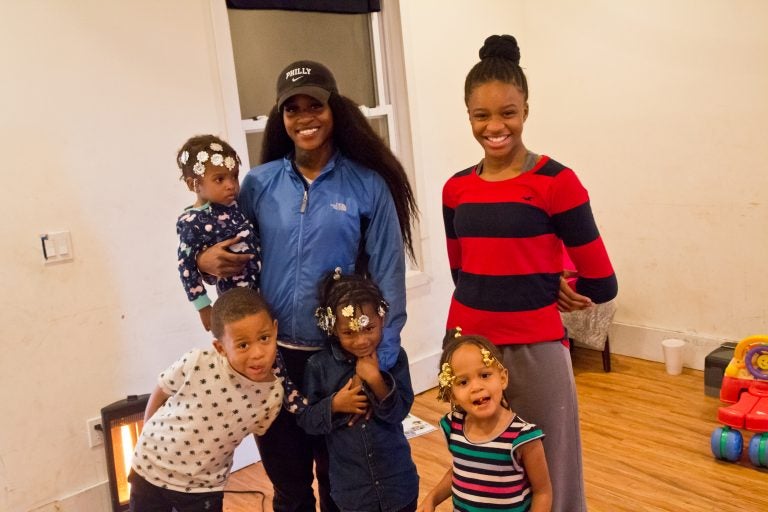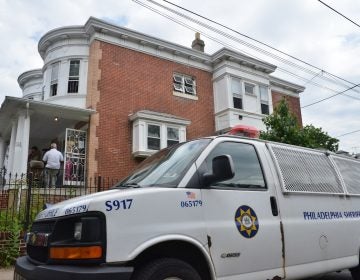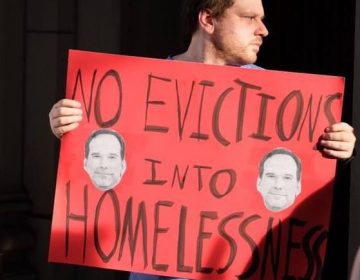Renters win new protections at City Hall with passage of 'good cause' bill
Most tenants get evicted because they cannot afford their rent, and non-payment is a “good cause” under the bill’s definition.

Ricci Rawls and her children, Patience, 12, Charlie, 7, Izzy, 5, Ava 4, and Faith, 1. (Kimberly Paynter/WHYY)
This article originally appeared on PlanPhilly.
—
Ricci Rawls stood before a packed City Council session on Thursday and testified passionately in favor of Councilman Curtis Jones’s “good cause” eviction bill, which is meant to protect renters from being suddenly and arbitrarily forced out of their homes.
Rawls is a mother of five and recently became homeless after losing her Section 8 voucher over a dispute with her landlord.
“What you don’t understand is that you are ignoring children,” Ross told the Councilmembers. “If you assisted families from being evicted, children and families could remain together. It costs a lot less money to keep tenants in their homes than to place a child in foster care.”
Ross’s speech came in support of Jones’s bill, which passed the Council unanimously. The new protections could go into effect before the end of the month, depending on when Mayor Jim Kenney signs the bill into law.
“You saw a unanimous vote because of a year of negotiations,” Jones said of the bill he introduced last October. “Some members would not have voted for the bill without changes.”
Jones amended the bill last week to only apply to month-to-month leases, which experts agree are a small minority of the rentals in the city. Even if Jones hadn’t shrunk the bill’s scope, however, it still would not have protected the overwhelmingly majority of tenants who face eviction.
Most tenants get evicted because they cannot afford their rent, and non-payment is a “good cause” under the bill’s definition.
The Philadelphia Tenants Union, the principal organization pushing for the bill, cheered the passage of the reduced legislation. They say month-to-month leases are concentrated in the bottom of the rental market, so the bill will still apply to the those households who need it most.
“In the spirit of compromise, concessions were made during negotiations and the amendment process,” acknowledged Jarrett Smith, the Tenants Union’s campaign director for the bill. “In the coming months, the PTU will continue to advocate for housing reform, including expanded provisions for Good Cause, right-to-counsel, and ultimately rent control.”
Right-to-counsel legislation would guarantee legal representation for tenants who end up in eviction court. Currently, the overwhelming majority of renters don’t have a lawyer when they go before a judge, while the overwhelming majority of landlords do. Most of the time, landlords win.
In a recent interview on WHYY’s RadioTimes Mayor Jim Kenney said the administration is discussing the idea with City Council. The Philadelphia Bar Association released a study in November advocating for the change, saying it would only cost $3.5 million a year.
Asked if he supported the policy, Jones gave an enthusiastic assent.
“All too often a person goes into a courtroom not knowing their rights,” said Jones. “They are therefore victimized because someone flashes a piece of paper in their face and says this is the law get out.”
Landlord lawyers dealing with uninformed and unrepresented renters can bully them into accepting bad terms, Jones said, and legal aid for tenants would address that issue.
But the Tenants Union’s other policy passion, rent control, he opposes.
“I know too many small business owners who are property managers to do that to them,” said Jones. “And Philadelphia isn’t in such demand as New York. That [rent regulation] is not needed in this city.”
Landlord groups like the Homeowners Association of Philadelphia (HAPCO) said they remain unhappy with the “good cause” legislation. HAPCO president Harvey Spear said they hoped to meet with Jones to discuss their issues.
As for Rawls, the legislation that passed at Thursday’s meeting would not have helped her case. But she spoke in favor of it anyway in the hope that it could help another mother facing eviction and homelessness.
“Twenty-eight families are put out of their home every day in Philadelphia,” said Rawls. “I’m not just speaking for me. When I speak, I speak for thousands.
WHYY is your source for fact-based, in-depth journalism and information. As a nonprofit organization, we rely on financial support from readers like you. Please give today.







